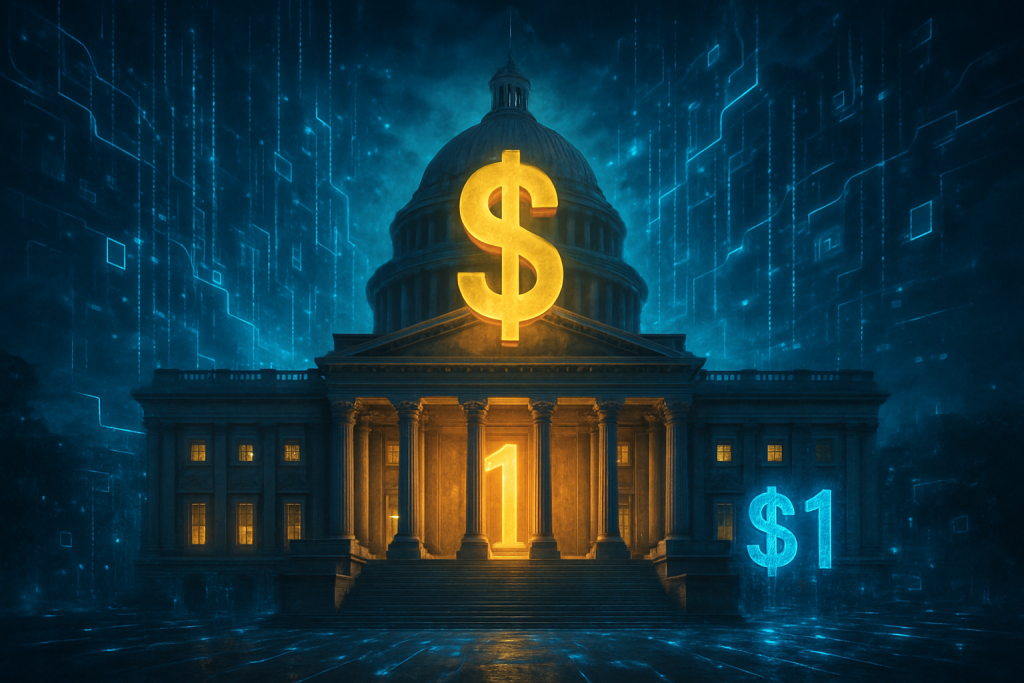In a move that’s equal parts audacious and brilliant, Anthropic, the AI wunderkind backed by Amazon, just offered its flagship chatbot, Claude, to the U.S. government for the princely sum of… one dollar. Yes, you read that right. One single George Washington gets you access to some of the most cutting-edge AI on the planet, at least if you’re Uncle Sam. It’s like those infomercials where they throw in a second widget “absolutely free!” except instead of a vegetable slicer, it’s a sophisticated AI capable of everything from drafting legislation to analyzing satellite imagery.
This isn’t just a quirky headline; it’s a strategic power play in the increasingly cutthroat world of AI dominance. Think of it as the AI equivalent of the Louisiana Purchase, only instead of land, it’s government contracts that are up for grabs.
So, why the fire sale? To understand the significance, we need to rewind a bit. For years, AI companies have been circling Washington D.C. like sharks smelling blood, or, perhaps more accurately, like venture capitalists smelling potential ROI. The U.S. government, with its vast resources and complex needs, is the ultimate whale client. Every agency, from the Department of Defense to the EPA, is exploring ways to leverage AI to improve efficiency, enhance security, and generally make life easier (or at least, that’s the theory). The problem? Getting your foot in the door.
That’s where Anthropic’s dollar-menu strategy comes in. By essentially giving away Claude, they’re hoping to secure a seat at the table, to become an indispensable partner in the government’s AI transformation. It’s the “loss leader” strategy taken to its logical extreme. Offer something incredibly valuable for next to nothing, get your hooks in, and then… well, let’s just say that the long-term revenue potential is significantly more than a single buck.
But it’s not just about the money, is it? This move also speaks to a deeper anxiety within the AI community: the fear of being left behind. Anthropic, along with OpenAI (makers of ChatGPT) and Google (with its Gemini model), recently made it onto the U.S. government’s “approved AI vendor” list. It’s the AI equivalent of getting your name on the guest list for the hottest party in town, and nobody wants to be the wallflower.
OpenAI has already made a similar move, offering ChatGPT Enterprise to federal agencies for a pittance. It’s a clear sign that the race is on to become the dominant AI provider for the public sector. The implications of this are enormous.
Imagine a world where Claude is embedded in every government agency, from the IRS to the FBI. It could be used to detect fraud, analyze crime patterns, predict infrastructure failures, or even help draft policy proposals. The possibilities are endless, and, frankly, a little bit terrifying. Think of the predictive policing algorithms in “Minority Report,” but instead of Tom Cruise, it’s a friendly AI chatbot making the recommendations.
Of course, there are ethical considerations to grapple with. Who controls Claude? How is its data used? What safeguards are in place to prevent bias or misuse? These are questions that policymakers are only beginning to address. The potential for AI to exacerbate existing inequalities or to be used for surveillance is very real, and it’s crucial that we have a serious conversation about these risks before we blindly embrace the AI revolution.
From a technical perspective, Claude’s architecture is designed for safety and interpretability. Anthropic has emphasized “constitutional AI,” training Claude to adhere to a set of principles that promote helpfulness, harmlessness, and honesty. This is a direct response to concerns about AI bias and the potential for AI to generate harmful or misleading content. However, even the most carefully designed AI is still susceptible to manipulation and unforeseen consequences.
And what about the financial impact? While Anthropic’s dollar deal might seem like a loss leader, the long-term potential is enormous. Government contracts are notoriously lucrative, and if Anthropic can establish itself as the go-to AI provider for the U.S. government, the returns could be astronomical. This could also trigger a wave of consolidation in the AI industry, as companies jockey for position to secure their own slice of the government pie. We might see smaller AI startups being acquired by larger players, or even the emergence of entirely new AI giants specifically focused on serving the public sector.
Ultimately, Anthropic’s dollar deal is a bold gamble with potentially huge rewards. It’s a sign that the AI revolution is not just coming; it’s already here, and it’s knocking on the door of every government agency in the country. Whether we’re ready or not, AI is poised to transform the way our government operates, and it’s up to us to ensure that this transformation is guided by principles of fairness, transparency, and accountability. The future is now, and it’s powered by AI. Let’s just hope we don’t end up like Skynet.
Discover more from Just Buzz
Subscribe to get the latest posts sent to your email.


